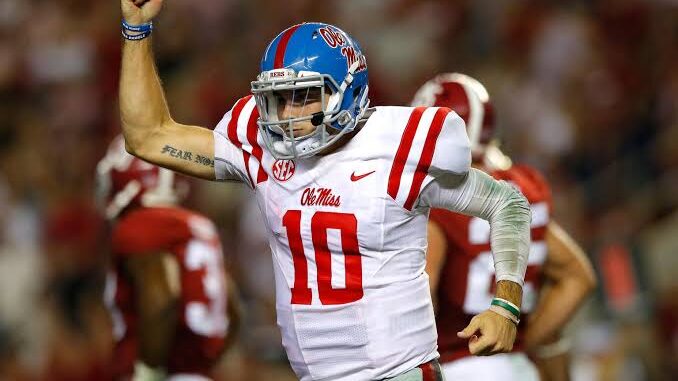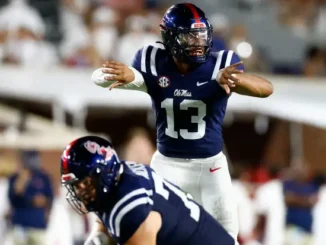
**Headline: He Was an Alabama Quarterback Who Had It All, but Couldn’t Stay Clean**
In the world of college football, few stories are as tragic as that of Jalen Smith, the once-promising quarterback for the University of Alabama, who seemed destined for stardom but ultimately became another cautionary tale about the dangers of fame, addiction, and losing one’s way.
Jalen Smith’s rise to prominence was meteoric. A five-star recruit out of high school, he was touted as the next great quarterback for the Alabama Crimson Tide. With his incredible arm strength, ability to read defenses, and charisma, Smith was the embodiment of everything that college football fans love: a player who had the talent and the drive to lead his team to victory on the grandest stage. His first season at Alabama was nothing short of spectacular, with Smith quickly earning the starting job and putting up eye-popping numbers in his debut campaign. His blend of athleticism, intelligence, and leadership skills quickly made him a household name.
But with fame came pressure, and as Smith’s profile grew, so did the challenges he faced off the field. Though Alabama’s storied program has produced countless NFL-bound quarterbacks, it also has a dark underbelly—a culture of high expectations, media scrutiny, and distractions that can overwhelm even the most talented athletes. For Smith, it wasn’t long before he was confronted with the trappings of fame.
Reports began to surface of off-the-field behavior that was inconsistent with the discipline expected of a quarterback at such a prestigious program. Smith had always been a private person, keeping much of his personal life out of the public eye. However, as his success grew, so did his exposure to the pressures of college life. The weight of being constantly in the spotlight, the expectation to perform at the highest level, and the increasing demands of life as a student-athlete began to take their toll.
It started slowly. At first, Smith was spotted at late-night parties, a common occurrence in the world of college football but one that often leads to much deeper issues. Friends of the quarterback began to notice changes in his behavior—he seemed more distant, often showing up to practices and games in a less-than-optimal state. His once-crisp throws became erratic, and his decision-making on the field began to slip. Coaches and teammates expressed concern, but Smith’s charm and natural ability kept him in the spotlight. It wasn’t until the 2023 season that the full extent of his struggles became apparent.
The turning point came during the annual Iron Bowl, a high-stakes rivalry game between Alabama and Auburn. Smith had been dealing with personal issues leading up to the game, but he appeared determined to push through. However, as the game went on, it was clear that something was wrong. Smith’s performance was uncharacteristically poor, and his decision-making seemed off. In the second half, he threw multiple interceptions, including one that ultimately sealed Alabama’s fate in a crushing defeat. After the game, there were rumors that Smith had been under the influence during the contest, though these were never officially confirmed.
Despite the loss, Smith remained in the spotlight, but the whispers about his personal life grew louder. It wasn’t long before Smith was suspended indefinitely from the team, with the official statement citing a violation of team policies. The suspension sent shockwaves through the college football world, as Smith was one of the most promising quarterbacks of his generation. However, the truth was that his battle with addiction had escalated to a point where it was no longer something that could be ignored.
For months, Smith disappeared from the public eye. Rumors circulated about his whereabouts and whether he was seeking help. Finally, in a rare interview, Smith opened up about his struggles. He spoke candidly about the pressures of being a star athlete, the toll it took on his mental health, and how he had turned to substances as a way to cope. “I had it all,” Smith said, his voice trembling. “I had the dream job, the dream life. But I didn’t know how to deal with the pressure. It’s easy to get lost in that world. And I did.”
His decision to come forward sparked a national conversation about the pressures faced by college athletes, especially those who are thrust into the limelight at a young age. Experts in mental health and addiction treatment praised Smith for his bravery in speaking out, but many also expressed concern about the systemic issues that contribute to the challenges faced by student-athletes. “We often forget that these players are still young people,” said Dr. Lisa Matthews, a psychologist specializing in sports addiction. “They’re given all this responsibility, but they’re not always equipped to handle the intense pressure, both on and off the field. For someone like Jalen, who had so much talent and promise, it’s heartbreaking to see how addiction can take hold.”
Smith’s journey from the heights of college football stardom to the depths of addiction and personal crisis is a cautionary tale that serves as a reminder of the dangers of fame, the fragility of mental health, and the need for better support systems for athletes.
As of now, Smith is reportedly seeking help and is determined to rebuild his life. While his football career may be over, his story is far from finished. Whether or not he will ever return to the field is uncertain, but his message of redemption and recovery is one that resonates with many.
For now, Jalen Smith remains an example of what can happen when someone seemingly has it all, but cannot stay clean. The story of his rise and fall will continue to serve as a reminder of the complex and often painful realities that come with fame, and the crucial need for mental health support in the world of sports.



Be the first to comment